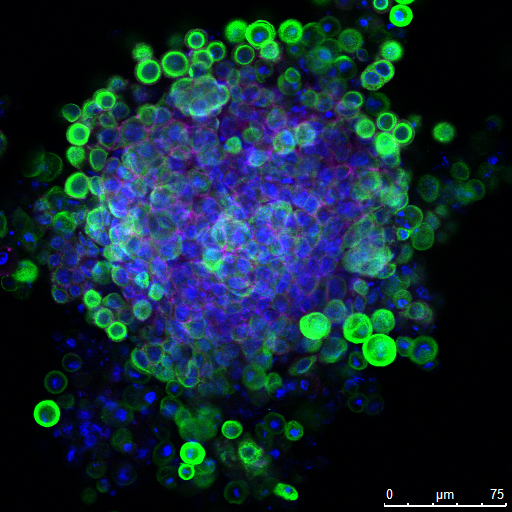Reprogrammable skin stem cells in a test-tube

Immunofluorescent image of hair follicle stem cells grown in a petri dish. Max Planck Institute for Biology of Ageing
To develop new treatments for skin cancer, drugs need to be tested on animals. Now scientists from the Max Planck Institute for Biology of Ageing in Cologne have been able to grow mouse skin stem cells in a dish. These stem cells in a test-tube could reduce the number of animal experiments.
Wounds need to heal and dead hairs need to be replaced. Responsible for this are the so-called hair follicle stem cells in our skin. These stem cells can mature into all the different cell types in the skin epidermis. If they are out of control skin cancer can develop.
“We wanted to develop a system to study hair follicle stem cells in the skin and their role in cancer development”, explains Carlos Andrés Chacón-Martínez, a scientist in the group of Sara Wickström at the Max Planck Institute for Biology of Ageing in Cologne. “Usually we need to use model organisms, such as mice. But it requires a large number of animals and years to study. With our new method we can readily investigate these stem cells in a petri dish in short periods. As a result we don’t need that many animals anymore.”
Reprograming of cells back into stem cells
To grow hair follicle stem cells in a petri dish the researchers initially need to extract skin cells from mice and place them in a three-dimensional gel made of proteins normally found in the skin. To stimulate cell growth the scientists added different factors, which regulate cell growth and survival. The hair follicle stem cells were able to survive for long time in the dish.
Studies of the Cologne scientists revealed that the 3D environment and the specific growth-promoting factors could even reprogram already differentiated cells back into stem cells, revealing that these cells are much more flexible and dynamic than was previously thought. “Now we are able to mimic the properties of the skin in the petri dish. We can study how the cells behave, when we, for example, irradiate them with UV light, instead of irradiating living mice. This culture system is a powerful tool to design and test interventions that might delay ageing and prevent cancer”, explains Chacón-Martínez.
Human skin
Now the researchers are adapting the system to human cells. “Growing human hair follicle stem cells with our method is likely to have important implications in regenerative medicine. Modern medicine is already able to grow and transplant human skin, but this is hairless. Maybe we could help bald men to regrow hair”, says Chacón-Martínez.
Media Contact
All latest news from the category: Life Sciences and Chemistry
Articles and reports from the Life Sciences and chemistry area deal with applied and basic research into modern biology, chemistry and human medicine.
Valuable information can be found on a range of life sciences fields including bacteriology, biochemistry, bionics, bioinformatics, biophysics, biotechnology, genetics, geobotany, human biology, marine biology, microbiology, molecular biology, cellular biology, zoology, bioinorganic chemistry, microchemistry and environmental chemistry.
Newest articles

Sea slugs inspire highly stretchable biomedical sensor
USC Viterbi School of Engineering researcher Hangbo Zhao presents findings on highly stretchable and customizable microneedles for application in fields including neuroscience, tissue engineering, and wearable bioelectronics. The revolution in…

Twisting and binding matter waves with photons in a cavity
Precisely measuring the energy states of individual atoms has been a historical challenge for physicists due to atomic recoil. When an atom interacts with a photon, the atom “recoils” in…

Nanotubes, nanoparticles, and antibodies detect tiny amounts of fentanyl
New sensor is six orders of magnitude more sensitive than the next best thing. A research team at Pitt led by Alexander Star, a chemistry professor in the Kenneth P. Dietrich…





















